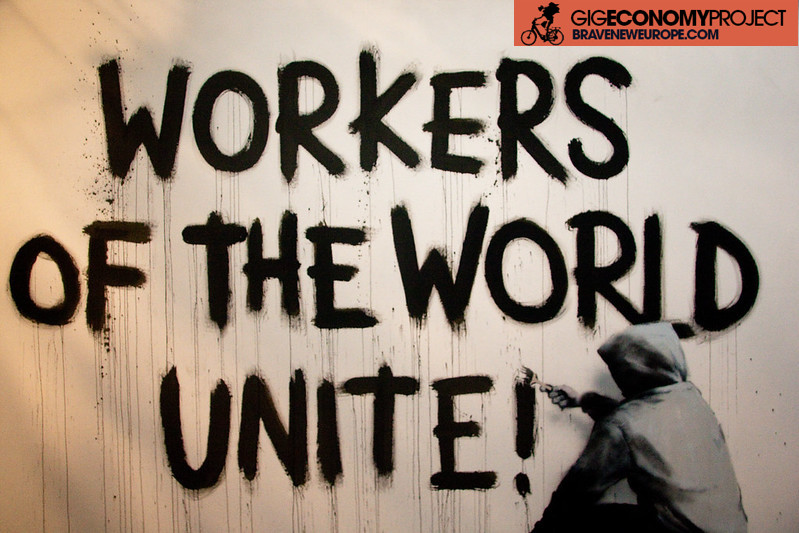Archie Mellor from the IWGB couriers’ branch in the UK and Rasmus Emil Hjorth from the Wolt Workers’ Group in Denmark make the case for food delivery couriers sharing their experiences with one another across borders, after a meeting of British and Danish riders in September to discuss vehicle theft and what to do about it

The Gig Economy Project, led by Ben Wray, was initiated by BRAVE NEW EUROPE enabling us to provide analysis, updates, ideas, and reports from all across Europe on the Gig Economy. If you have information or ideas to share, please contact Ben on GEP@Braveneweurope.com.
This series of articles concerning the Gig Economy in Europe is made possible thanks to the generous support of theAndrew Wainwright Reform Trust.

Food delivery companies and their owners operate transnationally. Even though they are engaged in different contexts and countries, these companies try to standardise their operating model. It doesn’t matter if you’re riding the streets of Manchester or Aarhus. The conditions of what used to be called ‘piece work’ still apply: precariousness, long hours and a lack of occupational health and safety.
Traditionally our respective union movements have organised on an isolationist basis, treating labour issues as only being dictated by domestic conditions. But the pandemic has opened up new markets in the gig economy, particularly in transport and logistics, and has forcefully tied the fate of workers together. This has led us to think about our labour conditions as not only being shaped by our city or country, but ultimately by faceless owners who we often both work for.
In September, the IWGB couriers branch in the UK and the 3F United food delivery workers in Denmark, as well as some members from the Wolt Worker’s Group, had an online meeting about vehicle theft and what we can do about it. While it might seem like an obvious thing to set-up meetings like this, it is not something we usually think about. The same technologies that the food delivery companies use, we can also use to chat about work-related issues.
From the IWGB side, stories were shared of community pressure, for instance in the Dalston campaign in North-East London, where riders fought for a safe waiting area for orders, after experiencing harassment on the streets from authorities and bypassers. With the support of different communities and local councillors, the riders’ fight for improvement ultimately led them to secure a room for leisure and charging stations for those couriers who work during the evening and night.
The Danish side spoke of frequent vehicle theft, often happening with expensive e-bikes. Recent campaigns to push local clients to demand higher standards for courier work safety were raised. This led to an interesting discussion between Danish and British riders about how we can build up more support within our communities.
Conversations like this lead to action, and we know that through strengthening our bonds with concrete work struggles, we make closer connections that are unbreakable for the food delivery bosses. We encourage our colleagues from other countries to do the same: reach out to others beyond your borders, and you might find colleagues that have experienced the same thing.
Only in this way can we build a stronger labour movement, as well as rediscovering the very soul of trade unionism, which is internationalism.
To sign up to the Gig Economy Project’s weekly newsletter, which provides up-to-date analysis and reports on everything that’s happening in the gig economy in Europe, leave your email here.
Support us and become part of a media that takes responsibility for society
BRAVE NEW EUROPE is a not-for-profit educational platform for economics, politics, and climate change that brings authors at the cutting edge of progressive thought together with activists and others with articles like this. If you would like to support our work and want to see more writing free of state or corporate media bias and free of charge. To maintain the impetus and impartiality we need fresh funds every month. Three hundred donors, giving £5 or 5 euros a month would bring us close to £1,500 monthly, which is enough to keep us ticking over.


Be the first to comment